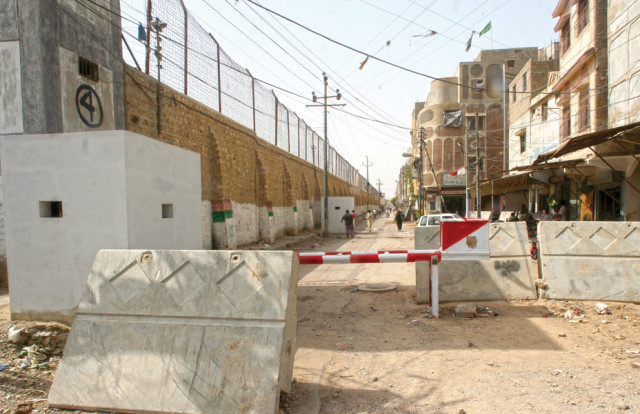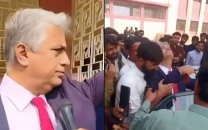Security measures: Imprisonment takes a whole different meaning for residents
Blockades on the streets around Karachi prison restrict access for residents.

With barriers and concrete blocks, jail authorities have restricted access to Ghousia Colony, located next to the Karachi prison on University Road. The barrier is locked and only opened for law enforcers and prison vans. PHOTOS: ATHAR KHAN/EXPRESS
Haq Nawaz’s wife stumbled thrice in distress as her brother led her to the main road to leave for Civil hospital. With mobile services disconnected in the area, she came to know about her husband’s death four hours later when a relative personally came to inform her.
She wept as she crossed the road blocked by the authorities. Her tears failed to make the police remove the barricade and let a rickshaw into the street. “Half of our relatives could not attend the funeral because mobiles don’t work here and we could not inform them,” she told The Express Tribune. “The police did not even let the funeral bus enter the area and we had to carry the body to the main road.”

The officials of the Karachi Central Jail have taken strict precautions to protect the prison from possible terrorists attacks but their measures have taken a toll on the hundreds of people living around the prison.
The entrance of Aslam Shaheed Road aka 30 Foot Sarak of Ghousia Colony, situated next to the jail on University Road has been sealed by a barricade, whose padlock remains with the police officers. Except for vehicles of the law enforcement agencies, no other vehicle can enter the area. Residents move on foot, some bring in their motorcycles after going through a maze of lanes; those who have cars park on the main road. Narrow lanes of the locality facing the prison have been shut off by big concrete blocks.
Losing business
Inside the locality which once buzzed with honking cars and men in greasy clothes fixing them, the showroom owners and mechanics sit idle. “Our work is basically about cars and since they can’t enter the area, we are facing 100 per cent losses,” claimed an owner of Wazir Motors. His showroom, which was once occupied with 30 cars has space for only 12 now, and those are now parked on the main road.

Khalid Ghouri who owns a showroom of new and used cars as well as a workshop, said they had gone to the Aziz Bhatti police station to complain but were snubbed by the officer. “We will now block roads, burn tyres and protest. That is the only way that our pleas will be heard.”
A mechanic, Mairaj, sadly admitted that he is now earning Rs3,000 a month. He managed to make Rs8,000 every month before the authorities closed down the roads and installed jammers. Eyeing the tall walls of the jail with barbed wires, the man laughed. “The jail seems like India, and the colony seems like Pakistan separated by a border,” he mocked.
Behind his shop was his family’s two-storey house, where his elderly aunt burst into tears. “We are on the verge of starving since there is not enough money for food or pay for children’s school fees.”
Road closed off
During the day, concrete barriers are placed in front of the jail on the main University Road, giving little space for vehicles to pass through. But from 9pm onwards till morning, the chunk of the road from Jail Chowrangi to Old Sabzi Mandi is completely sealed to transport. People passing through the area at night and going towards the other side towards Hasan Square, for example, have to take a long detour.
“It is a curfew-like situation at night,” said Khalid, a resident. “No one can get inside or leave.” Meanwhile, the police and Rangers guarding the jail have formed their own checkposts on the rooftops of residential apartments, demanding food and water from the residents at odd timings. “The privacy of our homes is disturbed by their presence. We feel unsafe with them around,” said one resident, Shakeel.
Residents also claimed that Rangers were harassing the young boys of the neighbourhood and punishing them if they catch them travelling together on motorcycles.
Mobile phone jammers
The presence of mobile phone jammers around the prison since January has affected Ghousia Colony, PIB Colony and Jamshed Road. Last month, prison minister Manzoor Wasan had announced that four of the seven jammers in the prison were being removed.
Residents complained that while mobile phones were operating in areas in front of the main entrance to the prison, the localities at the back side of the jail were still facing the problem of connectivity.
“We have to move at least one kilometre out of the area to use a mobile phone,” said Khalid. Shopkeepers who used to sell mobile phone pre-paid cards are now selling other items to make ends meet.
Wajidun Nisa, who has been living in the area for the last 40 years, complained about how difficult it is to remain in touch with their families. “After three days, I found out that my daughter was suffering from high fever,” she said, as she was leaving her house to meet her daughter. “I am a heart patient myself. What if I need help?”
The residents want the transfer of hardened criminals to other locations so security can return to normal. The prison superintendent, Kazi Nazeer Ahmed, said, however, that these extreme measures were taken to protect the residents. “The residential areas around the prison are the most vulnerable in case of an attack. We don’t want to create problems for anyone but we have to take steps for everyone’s security and prevent any attacks.”
Published in The Express Tribune, March 14th, 2014.



















COMMENTS
Comments are moderated and generally will be posted if they are on-topic and not abusive.
For more information, please see our Comments FAQ